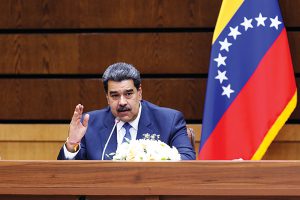Bloomberg
Dozens of Venezuelan opposition figures, who turned Colombia into their unofficial headquarters in recent years, say the election of Gustavo Petro as Colombia’s first leftist president puts them at risk, and they plan to leave.
Activists, party leaders, former officers and military deserters are making the move, according to seven people with knowledge of the plans. They’re afraid they’ll be harassed, spied on or even kidnapped. Petro takes office in a month, replacing conservative Ivan Duque, an outspoken opponent of Nicolas Maduro.
“I feel very unsafe in Colombia right now,†Pablo Parada, 32, a former student leader and political prisoner, said in an interview. “Maduro’s ties to the incoming president are no secret. We’re sure that Venezuela’s government will want members of the resistance and the military handed over. We’re a threat.â€
In a recent interview with El Pais newspaper, Petro said Venezuelan activists and journalists in Colombia would not face extradition under him. But his broader plans for them are unclear. Alvaro Leyva, the incoming foreign minister chosen by Petro, did not respond to messages seeking comment.
Ronal Rodriguez, a researcher at the Venezuelan Observatory at Rosario University in Bogota, said the opposition has had direct access to the highest levels of the government, helping shape policy towards Venezuela.
That will change under Petro who, he says, needs to take steps to protect persecuted Venezuelans.
The most prominent Venezuelan opposition figure looking for exit options is former National Assembly President Julio Borges, 52, who founded the Justice First party and has been in Bogota for more than four years.
The Caracas government issued an arrest warrant for him, accusing him of masterminding an explosive drone attack targeting Maduro. Another opposition lawmaker accused alongside him, Juan Requesens, is under house arrest in Caracas.
In Bogota, Borges bikes to meetings and takes walks in the park, a stark change from Caracas, where he was derided by Maduro officials and rode in bulletproof vehicles escorted by bodyguards. According to people who know him, he fears that once Petro is in office, he will face new threats. He didn’t respond to a request for comment.
Another key figure also looking to leave is Carlos Paparoni, a 33-year-old Venezuelan lawmaker who led several investigations into corruption and organized crime tied to the Maduro regime. He declined to comment.
While such prominent politicians are seeking political asylum or jobs in Miami, Washington or Madrid, most of the others— mid-level activists and army deserters —face more desperate choices.
 The Gulf Time Newspaper One of the finest business newspapers in the UAE brought to you by our professional writers and editors.
The Gulf Time Newspaper One of the finest business newspapers in the UAE brought to you by our professional writers and editors.
